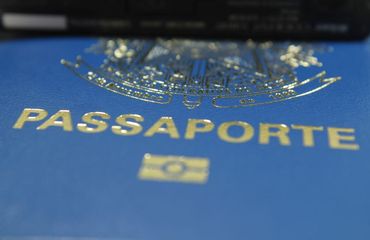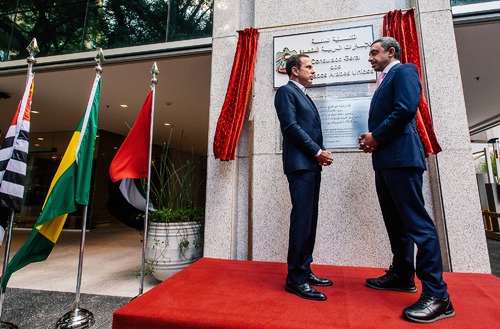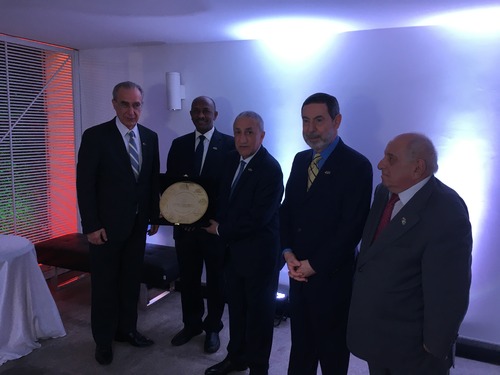São Paulo – At the end of November, the Brazilian Senate approved on the floor the agreement of visa mutual exemption between Brazil and the United Arab Emirates, a decision published days later on the Federal Official Gazette, signed by the Senate’s president, Eunício de Oliveira. Only lacking now are the fulfillment of requirements in the Arab nation to ratify the agreement in that country and the publishing of the international act so tourists from both countries to have easier access at the borders.
<
This is only one of the examples that brought Brazil closer to the Arab countries in 2017, a year marked by the visit of Brazilian authorities to the region’s countries and the visit of Arab authorities to Brazil, by progress in trade agreements, growth in trade relations and the strengthening of diplomatic ties.
In an interview to ANBA, the CEO of the Arab Brazilian Chamber of Commerce, Michel Alaby, recalled some of these facts – with most of them enjoying the support of the organization. “The performance of the Arab Chamber and the Brazilian government regarding Operação Carne Fraca, for instance, is a highlight,” said the executive.
In the morning of March 17, Brazilians were taken by surprise by an operation of the Federal Police that accused meat processing plants of tampering with the meat sold at both the local and international markets. As consequence, many countries discontinued immediately imports of Brazilian meat – among them, Saudi Arabia, Algeria, Qatar and Egypt. Quickly, the minister of Agriculture, Blairo Maggi, acted to explain that these were isolated cases and that the Brazilian meat being exported was of quality and that the exports of the processing plants being investigated were suspended.
<
The Arab Chamber scheduled a meeting in Brasília with the Council of Arab Ambassadors and representatives of the Ministry of Agriculture, Livestock and Supply (MAPA) to clarify the issue. Gradually, the suspensions were lifted – and, in May, a delegation headed by the minister visited the Gulf countries to, among other things, strengthen the image of Brazilian meat.
Not only Maggi visited the Gulf region. The first of the trips by João Dória, the mayor of São Paulo, last year, was to the UAE, and later to Qatar, in search of investments for the city of São Paulo. The governor of Goiás, Marconi Perillo, went to Saudi Arabia, and the mayor of Rio de Janeiro, Marcelo Crivella, visited the UAE in 2017.
Many authorities from Arab countries came to Brazil also: Abdullah Bin Zayed Al Nahyan, minister of Foreign Affairs and International Cooperation of the UAE; Khemaies Jhinaoui, Tunisia’s foreign minister; Nizar Yazigi, Syria’s minister of Health; Abdulrahman Alfadli, Saudi Arabia’s minister of Agriculture; and Tarek Kabil, Egypt’s minister of Commerce and Industry, talked with Brazilian authorities in São Paulo (SP) and Brasília (DF).
“The work was intense during the whole year,” said Alaby, who followed most of the official visits by Arab authorities to Brazil and maintained close contact to all ambassadors, both from an Arab country in Brasília, or a Brazilian ambassador in an Arab country. The executive pointed out that the Chamber also welcomed other Arab business missions, such as the one from the Dubai Chamber of Commerce and Industry, from the Free Zone of Ras Al-Khaimah, from the Qatar Development Bank, and from the Dubai Electricity & Water Authority (DEWA), among others.
<
Also, São Paulo saw the opening of the consulates of Sudan and of the United Arab Emirates. The latter was already in operation, but was only officially opened in a ceremony with authorities and the presence of the foreign minister of the Arab country, Abdullah Bin Zayed Al Nahyan.
“It was a year with many bumps, such as the Operação Carne Fraca and the Brazilian political environment, which caused uncertainty in the economy, with also with many positive points,” said Alaby.
The coming into effect of the free trade agreement between Mercosur and Egypt was a highlight in the year, according to Alaby, plus the progress in negotiations of other agreements with Tunisia, Lebanon and Morocco.
The Arabs invested in Brazil last year: Dubai-based DP World acquired 100% of the Brazilian Company of Port Terminals (Embraport), and now fully operates a terminal of the port of Santos. Meanwhile, the fund Mubalada, from Abu Dhabi, is in negotiations to acquire a share of Invepar, which manages, among other things, the Guarulhos International Airport and Metrô-Rio, Rio’s subway system.
On the other hand, BRF opened officially, in January, its branch focusing on the Halal market, One Foods, based in Dubai.
It was a record year for the trade balance with the Arab countries: a surplus of USD 7.1 billion. Imports increased 23.4% to USD 6.5 billion, while exports climbed 18.4%, reaching USD 13.6 billion. Trade between Brazil and the region reached USD 20 billion, 20% over 2016.
“At the beginning of last year, I had imagined a growth between 15% to 20% in exports,” recalled Alaby. For this year, the executive believes in an increase of at least 10% in Brazil’s foreign sales to the Arabs, surpassing USD 15 billion. A year of, who knows, a new record in exports to the region, with a result above the USD 15.1 billion registered in 2011, the largest in history until now.
Read more about the Arab Chamber’s actions in 2017 this Monday (22) on ANBA, in an interview with Rubens Hannun, the organization’s president.
*Translated by Sérgio Kakitani







